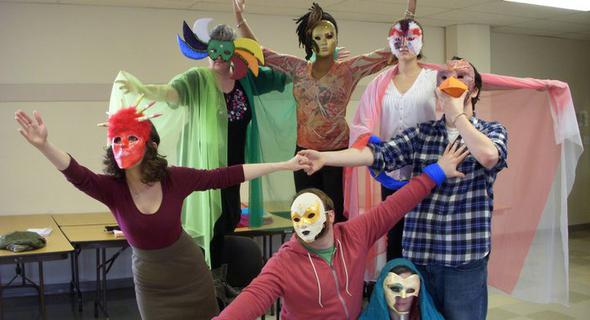A Career Option for the Theatre Major
Drama Therapy
As my son George graduates this spring from the University of Tampa as a musical theatre major, he dreams about earning a living performing on stage. But statistics show a very small percentage of actors will actually be able to accomplish this. My uncle’s motto in life was “Always have a Plan B, so theatre majors that enjoy working with people might want to consider a career in drama therapy.
Therapists have long been using art, music, and even dance to treat their clients, and now drama techniques are also being recognized as a great way to help people from all walks of life.
Drama therapists can work with patients in mental health facilities, substance abuse treatment centers, adolescent group homes, adult day care centers, hospitals, and nursing homes. They might work with children needing counseling, prisoners in correctional facilities, and with people in homeless shelters. A drama therapist can help them tell their stories, set goals, and solve their problems.
After assessing a client’s needs and designing a program specifically for them, a drama therapist might use techniques such as improvisation, role-playing, theatre games, puppets, and reenactments. As one client reported after a series of therapy sessions, “Drama showed me how to interact with others. Most of all, it gave me a way to have excitement in my life without the use of drugs.”
Therapists have long been using art, music, and even dance to treat their clients, and now drama techniques are also being recognized as a great way to help people from all walks of life.
Working with younger and older adults
Anne Curtis of Maitland, Florida was doing drama therapy without realizing it for over twenty-five years. After studying theatre in undergrad, she taught creative dramatics and worked as a counselor for abused and grieving children, and was thrilled to find out she could take courses locally and become registered as an official drama therapist.
Curtis recalls an example of the power of drama therapy when she was working with children putting on comedy skits. One young boy who normally sat quietly and did not participate volunteered to do one himself. He was having a great time crashing a pretend car over and over again, and it turned out he had been in a bad car accident where his sister was killed. He realized he could not only laugh again but make others laugh as well. “This is exactly what is needed,” says Curtis. “Talk therapy is great but people need so much more than that. They need to move around, feel their emotions and act things out where they can change the outcome.”
The elderly are also perfect candidates for drama therapy. Many are suffering from an illness or grieving the loss of a loved one, and Curtis makes every effort to re-energize them and get them to smile. At adult daycare facilities she uses a lot of sensory props to remind them of great times from their past. She’s celebrated the 4th of July, with everyone holding homemade instruments for an imaginary band leading a parade. The holiday might bring back memories of going to the beach, so she’ll bring in seashells and picnic supplies. “Before you know it, everyone is spitting watermelon seeds at each other and laughing hysterically,” Curtis recalls.
Today Curtis can be found pushing a cart full of feather boas, stuffed animals, smile masks, and bottles of “healing bubbles” at the South Seminole Hospital in Florida. She works individually with patients to help “lift their spirits” as part of the hospital’s healing arts program. Curtis’s main goal is to “give my patients a few minutes of happiness and leave them with a more hopeful attitude.”

Helping Adolescents
Lanell Finneran has been combining drama with special education for over thirty-four years. She primarily treats adolescents who have mental health issues, and has worked in public school settings, the Menninger Psychiatric Hospital where kids came from all over the world, and currently in the Secondary Therapeutic Classroom in Lawrence, Kansas. With a double major in psychology and theatre from Kansas State, she also has a Master’s degree in special education with an emphasis on emotional disturbances. Finneran took additional coursework to become a registered drama therapist and now works as a board certified trainer as well.
In the Secondary Therapeutic day program, students take both academic and therapeutic classes until they are ready to slowly transition back to their local high school. Warm-up games help get the group to bond and trust each other as they work on their social skills in a safe setting. Activities might include videotaping scenes that have alternate endings with the best solution to a problem. Recently, with a grant from the Ezra Jack Keats foundation, students wrote scenes and made puppets about bullying, and the shows were presented at the local elementary schools.
“As a result of these efforts, I notice a lot more self-confidence in our clients,” Finneran says. “They are more outgoing and learn how to make eye contact without giving up a feeling of safety. They leave with a ‘toolbox’ of skills on how to handle uncomfortable situations in school. Students are able to approach teachers and let them know they are struggling, and also feel ready to repair relationships with parents and siblings.”
It was very inspiring to hear how Anne Curtis and Lanell Finnernan make a real impact on people’s lives using their talents as actors and directors. Drama therapy would also make a great day job, leaving time for an actor to perform on stage in the evening.
Becoming a Registered Drama Therapist
The National Association of Drama Therapy (NADT) was founded in 1979 to establish standards of professional competence. To qualify as a registered drama therapist, one must have a master’s or doctoral degree in drama therapy from an accredited program approved by the NADT. A person could also have a master’s or doctoral degree in theatre or a mental health profession and then receive in-depth instruction in drama therapy from the Association’s alternative training program. In addition, there is minimum number of direct-client hours required in a drama therapy internship with supervision by a registered drama therapist, special educator, a credentialed creative arts therapist or a mental health professional. An applicant needs to work with at least two different populations such as the emotionally disturbed, physically disabled, teens, or the elderly.
Two colleges that offer an undergraduate program in drama therapy are Quinnipiac University in Hamden, Connecticut and Manhattanville College in Purchase, New York. Others that offer graduate level programs include New York University in New York City, California Institute of Integral Studies in San Francisco, Lesley University in Cambridge, Massachusetts, Antioch University in Seattle, Washington and Concordia University in Montreal, Canada.
Curtis advises anyone who might be interested in a career in drama therapy to first get strong theatre training in movement and breathing techniques, improvisation, and other skills in creative dramatics. “Take a lot of courses in psychology and do volunteer work with people with mental health issues, autistic kids, the elderly, or anyone with a disability. Read every book you can find on theatre and help write and direct plays. Go where your passion leads you and take along the same confidence you have when performing on stage, knowing you are well-prepared.”









Comments
The article is just the start of the conversation—we want to know what you think about this subject, too! HowlRound is a space for knowledge-sharing, and we welcome spirited, thoughtful, and on-topic dialogue. Find our full comments policy here
These programs look wonderful, but the costs are crazy. I find it hard to believe that anyone other than the financially privileged or people wiling to take out huge loans and live in poverty would pursue these degrees. Particularly when the field is still only marginally known.